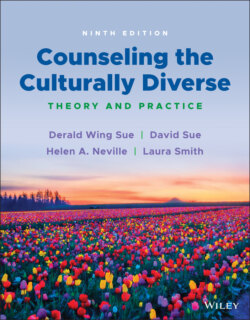Читать книгу Counseling the Culturally Diverse - Laura Smith L. - Страница 26
COGNITIVE RESISTANCE—DENIAL
ОглавлениеTo date, my biggest discovery is that I didn't really believe that people were being discriminated against because of their race. I could hear them say it, but in my head, I kept running a parallel reason from the White perspective. A Chinese lady says that her party had to wait longer while Whites kept getting seated in front of them. I say, other people had made reservations. A black man says that the receptionist was rude, and made him wait longer because he's Black. I say she had a bad day, and the person he was there to see was busy. A Puerto Rican couple says that the second they drove into Modesto … a cop started tailing them, and continued to do so until they reached their hotel, which they opted to drive right on by because they didn't feel safe. I say, there's nothing to be afraid of in Modesto. It's a nice little town. And surely the cop wasn't following you because you're Puerto Rican. I bet your hotel was on his way to the station. I know that for every story in which something bad happens to someone because of their race, I can counter it with a White interpretation. Moreover, while I was listening with a sympathetic ear, I silently continued to offer up alternative explanations, benign explanations that kept my world in equilibrium. (Rabow, Venieris, & Dhillon, 2014, p. 189)
This student account reveals a pattern of entertaining alternative explanations to the stories told by Persons of Color about their experiences of prejudice and discrimination. Although the author describes “listening sympathetically,” it was clear that he or she silently did not believe that these were instances of racism; other more plausible and “benign” explanations could account for the events. This is not an atypical response for many White trainees when they listen to stories of discrimination from classmates of color (Sue, 2015; Young, 2003). Because of a strong belief that racism is a thing of the past, that we live in a post‐racial society, and that equal access and opportunity are open to everyone, People of Color are seen as exaggerating or misperceiving situations. When stories of prejudice and discrimination are told, it directly challenges these cherished beliefs. The student's quote indicates as much when he says that the “benign explanations” preserves his or her racial reality (“kept my world in equilibrium”).
The fact that the student chose not to voice his or her thoughts is actually an impediment to learning and understanding. In many classrooms, teachers have noted how silence is used by some White students to mask or conceal their true thoughts and feelings about multicultural issues (Appiah, Eveland, Bullock, & Coduto, 2021; Sue, Torino, Capodilupo, Rivera, & Lin, 2010). Denial through disbelief, unwillingness to consider alternative scenarios, distortion, fabrication, and rationalizations are all mechanisms frequently used by some trainees during racial conversations to prevent them from thinking about or discussing topics of race and racism in an honest manner (van Dijk, 1992; Sue, 2015; Sue, Rivera, Capodilupo, Lin, & Torino, 2010). In our teaching in multicultural classes, we have observed many types of denials that work against honest diversity discussions. There are denials that students are prejudiced, that racism still exists, that they are responsible for the oppression of others, that White American occupy an advantaged and privileged position, that they hold power over People of Color, and even denial that they are White (Feagin & Vera, 2002; McIntosh, 2002; Sue & Spanierman, 2020; Tatum, 1992; Todd & Abrams, 2011). This latter point (Whiteness and White privilege) is an especially “hot topic” that will be thoroughly discussed in Chapter 7. As a trainee in this course, you will be presented with opportunities to discuss these topics in detail, and explore what these denials may mean about you and your classmates. We hope you will actively participate in such discussions, rather than passively dealing with the material.
